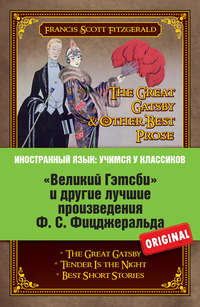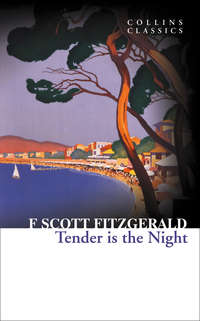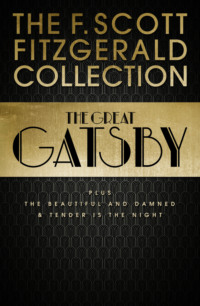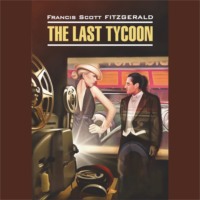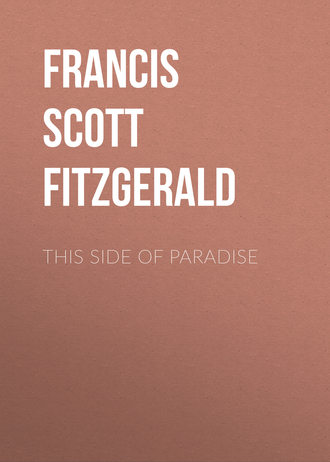 полная версия
полная версияThis Side of Paradise
“Well, I can’t judge. A man, of course, has to go through a lot more, and I’ve been sheltered.”
“Oh, don’t stall, please, Clara,” Amory interrupted; “but do talk about me a little, won’t you?”
“Surely, I’d adore to.” She didn’t smile.
“That’s sweet of you. First answer some questions. Am I painfully conceited?”
“Well – no, you have tremendous vanity, but it’ll amuse the people who notice its preponderance.”
“I see.”
“You’re really humble at heart. You sink to the third hell of depression when you think you’ve been slighted. In fact, you haven’t much self-respect.”
“Centre of target twice, Clara. How do you do it? You never let me say a word.”
“Of course not – I can never judge a man while he’s talking. But I’m not through; the reason you have so little real self-confidence, even though you gravely announce to the occasional philistine that you think you’re a genius, is that you’ve attributed all sorts of atrocious faults to yourself and are trying to live up to them. For instance, you’re always saying that you are a slave to high-balls.”
“But I am, potentially.”
“And you say you’re a weak character, that you’ve no will.”
“Not a bit of will – I’m a slave to my emotions, to my likes, to my hatred of boredom, to most of my desires – ”
“You are not!” She brought one little fist down onto the other. “You’re a slave, a bound helpless slave to one thing in the world, your imagination.”
“You certainly interest me. If this isn’t boring you, go on.”
“I notice that when you want to stay over an extra day from college you go about it in a sure way. You never decide at first while the merits of going or staying are fairly clear in your mind. You let your imagination shinny on the side of your desires for a few hours, and then you decide. Naturally your imagination, after a little freedom, thinks up a million reasons why you should stay, so your decision when it comes isn’t true. It’s biassed.”
“Yes,” objected Amory, “but isn’t it lack of will-power to let my imagination shinny on the wrong side?”
“My dear boy, there’s your big mistake. This has nothing to do with will-power; that’s a crazy, useless word, anyway; you lack judgment – the judgment to decide at once when you know your imagination will play you false, given half a chance.”
“Well, I’ll be darned!” exclaimed Amory in surprise, “that’s the last thing I expected.”
Clara didn’t gloat. She changed the subject immediately. But she had started him thinking and he believed she was partly right. He felt like a factory-owner who after accusing a clerk of dishonesty finds that his own son, in the office, is changing the books once a week. His poor, mistreated will that he had been holding up to the scorn of himself and his friends, stood before him innocent, and his judgment walked off to prison with the unconfinable imp, imagination, dancing in mocking glee beside him. Clara’s was the only advice he ever asked without dictating the answer himself – except, perhaps, in his talks with Monsignor Darcy.
How he loved to do any sort of thing with Clara! Shopping with her was a rare, epicurean dream. In every store where she had ever traded she was whispered about as the beautiful Mrs. Page.
“I’ll bet she won’t stay single long.”
“Well, don’t scream it out. She ain’t lookin’ for no advice.”
“Ain’t she beautiful!”
(Enter a floor-walker – silence till he moves forward, smirking.)
“Society person, ain’t she?”
“Yeah, but poor now, I guess; so they say.”
“Gee! girls, ain’t she some kid!”
And Clara beamed on all alike. Amory believed that tradespeople gave her discounts, sometimes to her knowledge and sometimes without it. He knew she dressed very well, had always the best of everything in the house, and was inevitably waited upon by the head floor-walker at the very least.
Sometimes they would go to church together on Sunday and he would walk beside her and revel in her cheeks moist from the soft water in the new air. She was very devout, always had been, and God knows what heights she attained and what strength she drew down to herself when she knelt and bent her golden hair into the stained-glass light.
“St. Cecelia,” he cried aloud one day, quite involuntarily, and the people turned and peered, and the priest paused in his sermon and Clara and Amory turned to fiery red.
That was the last Sunday they had, for he spoiled it all that night. He couldn’t help it.
They were walking through the March twilight where it was as warm as June, and the joy of youth filled his soul so that he felt he must speak.
“I think,” he said and his voice trembled, “that if I lost faith in you I’d lose faith in God.”
She looked at him with such a startled face that he asked her the matter.
“Nothing,” she said slowly, “only this: five men have said that to me before, and it frightens me.”
“Oh, Clara, is that your fate!”
She did not answer.
“I suppose love to you is – ” he began.
She turned like a flash.
“I have never been in love.”
They walked along, and he realized slowly how much she had told him… never in love… She seemed suddenly a daughter of light alone. His entity dropped out of her plane and he longed only to touch her dress with almost the realization that Joseph must have had of Mary’s eternal significance. But quite mechanically he heard himself saying:
“And I love you – any latent greatness that I’ve got is… oh, I can’t talk, but Clara, if I come back in two years in a position to marry you – ”
She shook her head.
“No,” she said; “I’d never marry again. I’ve got my two children and I want myself for them. I like you – I like all clever men, you more than any – but you know me well enough to know that I’d never marry a clever man – ” She broke off suddenly.
“Amory.”
“What?”
“You’re not in love with me. You never wanted to marry me, did you?”
“It was the twilight,” he said wonderingly. “I didn’t feel as though I were speaking aloud. But I love you – or adore you – or worship you – ”
“There you go – running through your catalogue of emotions in five seconds.”
He smiled unwillingly.
“Don’t make me out such a light-weight, Clara; you are depressing sometimes.”
“You’re not a light-weight, of all things,” she said intently, taking his arm and opening wide her eyes – he could see their kindliness in the fading dusk. “A light-weight is an eternal nay.”
“There’s so much spring in the air – there’s so much lazy sweetness in your heart.”
She dropped his arm.
“You’re all fine now, and I feel glorious. Give me a cigarette. You’ve never seen me smoke, have you? Well, I do, about once a month.”
And then that wonderful girl and Amory raced to the corner like two mad children gone wild with pale-blue twilight.
“I’m going to the country for to-morrow,” she announced, as she stood panting, safe beyond the flare of the corner lamp-post. “These days are too magnificent to miss, though perhaps I feel them more in the city.”
“Oh, Clara!” Amory said; “what a devil you could have been if the Lord had just bent your soul a little the other way!”
“Maybe,” she answered; “but I think not. I’m never really wild and never have been. That little outburst was pure spring.”
“And you are, too,” said he.
They were walking along now.
“No – you’re wrong again, how can a person of your own self-reputed brains be so constantly wrong about me? I’m the opposite of everything spring ever stood for. It’s unfortunate, if I happen to look like what pleased some soppy old Greek sculptor, but I assure you that if it weren’t for my face I’d be a quiet nun in the convent without” – then she broke into a run and her raised voice floated back to him as he followed – “my precious babies, which I must go back and see.”
She was the only girl he ever knew with whom he could understand how another man might be preferred. Often Amory met wives whom he had known as debutantes, and looking intently at them imagined that he found something in their faces which said:
“Oh, if I could only have gotten you!” Oh, the enormous conceit of the man!
But that night seemed a night of stars and singing and Clara’s bright soul still gleamed on the ways they had trod.
“Golden, golden is the air – ” he chanted to the little pools of water. … “Golden is the air, golden notes from golden mandolins, golden frets of golden violins, fair, oh, wearily fair… Skeins from braided basket, mortals may not hold; oh, what young extravagant God, who would know or ask it?.. who could give such gold…”
AMORY IS RESENTFULSlowly and inevitably, yet with a sudden surge at the last, while Amory talked and dreamed, war rolled swiftly up the beach and washed the sands where Princeton played. Every night the gymnasium echoed as platoon after platoon swept over the floor and shuffled out the basket-ball markings. When Amory went to Washington the next week-end he caught some of the spirit of crisis which changed to repulsion in the Pullman car coming back, for the berths across from him were occupied by stinking aliens – Greeks, he guessed, or Russians. He thought how much easier patriotism had been to a homogeneous race, how much easier it would have been to fight as the Colonies fought, or as the Confederacy fought. And he did no sleeping that night, but listened to the aliens guffaw and snore while they filled the car with the heavy scent of latest America.
In Princeton every one bantered in public and told themselves privately that their deaths at least would be heroic. The literary students read Rupert Brooke passionately; the lounge-lizards worried over whether the government would permit the English-cut uniform for officers; a few of the hopelessly lazy wrote to the obscure branches of the War Department, seeking an easy commission and a soft berth.
Then, after a week, Amory saw Burne and knew at once that argument would be futile – Burne had come out as a pacifist. The socialist magazines, a great smattering of Tolstoi, and his own intense longing for a cause that would bring out whatever strength lay in him, had finally decided him to preach peace as a subjective ideal.
“When the German army entered Belgium,” he began, “if the inhabitants had gone peaceably about their business, the German army would have been disorganized in – ”
“I know,” Amory interrupted, “I’ve heard it all. But I’m not going to talk propaganda with you. There’s a chance that you’re right – but even so we’re hundreds of years before the time when non-resistance can touch us as a reality.”
“But, Amory, listen – ”
“Burne, we’d just argue – ”
“Very well.”
“Just one thing – I don’t ask you to think of your family or friends, because I know they don’t count a picayune with you beside your sense of duty – but, Burne, how do you know that the magazines you read and the societies you join and these idealists you meet aren’t just plain German?”
“Some of them are, of course.”
“How do you know they aren’t all pro-German – just a lot of weak ones – with German-Jewish names.”
“That’s the chance, of course,” he said slowly. “How much or how little I’m taking this stand because of propaganda I’ve heard, I don’t know; naturally I think that it’s my most innermost conviction – it seems a path spread before me just now.”
Amory’s heart sank.
“But think of the cheapness of it – no one’s really going to martyr you for being a pacifist – it’s just going to throw you in with the worst – ”
“I doubt it,” he interrupted.
“Well, it all smells of Bohemian New York to me.”
“I know what you mean, and that’s why I’m not sure I’ll agitate.”
“You’re one man, Burne – going to talk to people who won’t listen – with all God’s given you.”
“That’s what Stephen must have thought many years ago. But he preached his sermon and they killed him. He probably thought as he was dying what a waste it all was. But you see, I’ve always felt that Stephen’s death was the thing that occurred to Paul on the road to Damascus, and sent him to preach the word of Christ all over the world.”
“Go on.”
“That’s all – this is my particular duty. Even if right now I’m just a pawn – just sacrificed. God! Amory – you don’t think I like the Germans!”
“Well, I can’t say anything else – I get to the end of all the logic about non-resistance, and there, like an excluded middle, stands the huge spectre of man as he is and always will be. And this spectre stands right beside the one logical necessity of Tolstoi’s, and the other logical necessity of Nietzsche’s – ” Amory broke off suddenly. “When are you going?”
“I’m going next week.”
“I’ll see you, of course.”
As he walked away it seemed to Amory that the look in his face bore a great resemblance to that in Kerry’s when he had said good-by under Blair Arch two years before. Amory wondered unhappily why he could never go into anything with the primal honesty of those two.
“Burne’s a fanatic,” he said to Tom, “and he’s dead wrong and, I’m inclined to think, just an unconscious pawn in the hands of anarchistic publishers and German-paid rag wavers – but he haunts me – just leaving everything worth while – ”
Burne left in a quietly dramatic manner a week later. He sold all his possessions and came down to the room to say good-by, with a battered old bicycle, on which he intended to ride to his home in Pennsylvania.
“Peter the Hermit bidding farewell to Cardinal Richelieu,” suggested Alec, who was lounging in the window-seat as Burne and Amory shook hands.
But Amory was not in a mood for that, and as he saw Burne’s long legs propel his ridiculous bicycle out of sight beyond Alexander Hall, he knew he was going to have a bad week. Not that he doubted the war – Germany stood for everything repugnant to him; for materialism and the direction of tremendous licentious force; it was just that Burne’s face stayed in his memory and he was sick of the hysteria he was beginning to hear.
“What on earth is the use of suddenly running down Goethe,” he declared to Alec and Tom. “Why write books to prove he started the war – or that that stupid, overestimated Schiller is a demon in disguise?”
“Have you ever read anything of theirs?” asked Tom shrewdly.
“No,” Amory admitted.
“Neither have I,” he said laughing.
“People will shout,” said Alec quietly, “but Goethe’s on his same old shelf in the library – to bore any one that wants to read him!”
Amory subsided, and the subject dropped.
“What are you going to do, Amory?”
“Infantry or aviation, I can’t make up my mind – I hate mechanics, but then of course aviation’s the thing for me – ”
“I feel as Amory does,” said Tom. “Infantry or aviation – aviation sounds like the romantic side of the war, of course – like cavalry used to be, you know; but like Amory I don’t know a horse-power from a piston-rod.”
Somehow Amory’s dissatisfaction with his lack of enthusiasm culminated in an attempt to put the blame for the whole war on the ancestors of his generation… all the people who cheered for Germany in 1870… All the materialists rampant, all the idolizers of German science and efficiency. So he sat one day in an English lecture and heard “Locksley Hall” quoted and fell into a brown study with contempt for Tennyson and all he stood for – for he took him as a representative of the Victorians.
Victorians, Victorians, who never learned to weep Who sowed the bitter harvest that your children go to reap —scribbled Amory in his note-book. The lecturer was saying something about Tennyson’s solidity and fifty heads were bent to take notes. Amory turned over to a fresh page and began scrawling again.
“They shuddered when they found what Mr. Darwin was about, They shuddered when the waltz came in and Newman hurried out – ”But the waltz came in much earlier; he crossed that out.
“And entitled A Song in the Time of Order,” came the professor’s voice, droning far away. “Time of Order” – Good Lord! Everything crammed in the box and the Victorians sitting on the lid smiling serenely… With Browning in his Italian villa crying bravely: “All’s for the best.” Amory scribbled again.
“You knelt up in the temple and he bent to hear you pray, You thanked him for your ‘glorious gains’ – reproached him for ‘Cathay.’”Why could he never get more than a couplet at a time? Now he needed something to rhyme with:
“You would keep Him straight with science, tho He had gone wrong before…”Well, anyway…
“You met your children in your home – ‘I’ve fixed it up!’ you cried, Took your fifty years of Europe, and then virtuously – died.”“That was to a great extent Tennyson’s idea,” came the lecturer’s voice. “Swinburne’s Song in the Time of Order might well have been Tennyson’s title. He idealized order against chaos, against waste.”
At last Amory had it. He turned over another page and scrawled vigorously for the twenty minutes that was left of the hour. Then he walked up to the desk and deposited a page torn out of his note-book.
“Here’s a poem to the Victorians, sir,” he said coldly.
The professor picked it up curiously while Amory backed rapidly through the door.
Here is what he had written:
“Songs in the time of order You left for us to sing, Proofs with excluded middles, Answers to life in rhyme, Keys of the prison warder And ancient bells to ring, Time was the end of riddles, We were the end of time… Here were domestic oceans And a sky that we might reach, Guns and a guarded border, Gantlets – but not to fling, Thousands of old emotions And a platitude for each, Songs in the time of order — And tongues, that we might sing.”THE END OF MANY THINGSEarly April slipped by in a haze – a haze of long evenings on the club veranda with the graphophone playing “Poor Butterfly” inside… for “Poor Butterfly” had been the song of that last year. The war seemed scarcely to touch them and it might have been one of the senior springs of the past, except for the drilling every other afternoon, yet Amory realized poignantly that this was the last spring under the old regime.
“This is the great protest against the superman,” said Amory.
“I suppose so,” Alec agreed.
“He’s absolutely irreconcilable with any Utopia. As long as he occurs, there’s trouble and all the latent evil that makes a crowd list and sway when he talks.”
“And of course all that he is is a gifted man without a moral sense.”
“That’s all. I think the worst thing to contemplate is this – it’s all happened before, how soon will it happen again? Fifty years after Waterloo Napoleon was as much a hero to English school children as Wellington. How do we know our grandchildren won’t idolize Von Hindenburg the same way?”
“What brings it about?”
“Time, damn it, and the historian. If we could only learn to look on evil as evil, whether it’s clothed in filth or monotony or magnificence.”
“God! Haven’t we raked the universe over the coals for four years?”
Then the night came that was to be the last. Tom and Amory, bound in the morning for different training-camps, paced the shadowy walks as usual and seemed still to see around them the faces of the men they knew.
“The grass is full of ghosts to-night.”
“The whole campus is alive with them.”
They paused by Little and watched the moon rise, to make silver of the slate roof of Dodd and blue the rustling trees.
“You know,” whispered Tom, “what we feel now is the sense of all the gorgeous youth that has rioted through here in two hundred years.”
A last burst of singing flooded up from Blair Arch – broken voices for some long parting.
“And what we leave here is more than this class; it’s the whole heritage of youth. We’re just one generation – we’re breaking all the links that seemed to bind us here to top-booted and high-stocked generations. We’ve walked arm and arm with Burr and Light-Horse Harry Lee through half these deep-blue nights.”
“That’s what they are,” Tom tangented off, “deep blue – a bit of color would spoil them, make them exotic. Spires, against a sky that’s a promise of dawn, and blue light on the slate roofs – it hurts… rather – ”
“Good-by, Aaron Burr,” Amory called toward deserted Nassau Hall, “you and I knew strange corners of life.”
His voice echoed in the stillness.
“The torches are out,” whispered Tom. “Ah, Messalina, the long shadows are building minarets on the stadium – ”
For an instant the voices of freshman year surged around them and then they looked at each other with faint tears in their eyes.
“Damn!”
“Damn!”
The last light fades and drifts across the land – the low, long land, the sunny land of spires; the ghosts of evening tune again their lyres and wander singing in a plaintive band down the long corridors of trees; pale fires echo the night from tower top to tower: Oh, sleep that dreams, and dream that never tires, press from the petals of the lotus flower something of this to keep, the essence of an hour.
No more to wait the twilight of the moon in this sequestered vale of star and spire, for one eternal morning of desire passes to time and earthy afternoon. Here, Heraclitus, did you find in fire and shifting things the prophecy you hurled down the dead years; this midnight my desire will see, shadowed among the embers, furled in flame, the splendor and the sadness of the world.
INTERLUDE
May, 1917-February, 1919A letter dated January, 1918, written by Monsignor Darcy to Amory, who is a second lieutenant in the 171st Infantry, Port of Embarkation, Camp Mills, Long Island.
MY DEAR BOY:All you need tell me of yourself is that you still are; for the rest I merely search back in a restive memory, a thermometer that records only fevers, and match you with what I was at your age. But men will chatter and you and I will still shout our futilities to each other across the stage until the last silly curtain falls plump! upon our bobbing heads. But you are starting the spluttering magic-lantern show of life with much the same array of slides as I had, so I need to write you if only to shriek the colossal stupidity of people…
This is the end of one thing: for better or worse you will never again be quite the Amory Blaine that I knew, never again will we meet as we have met, because your generation is growing hard, much harder than mine ever grew, nourished as they were on the stuff of the nineties.
Amory, lately I reread Aeschylus and there in the divine irony of the “Agamemnon” I find the only answer to this bitter age – all the world tumbled about our ears, and the closest parallel ages back in that hopeless resignation. There are times when I think of the men out there as Roman legionaries, miles from their corrupt city, stemming back the hordes… hordes a little more menacing, after all, than the corrupt city… another blind blow at the race, furies that we passed with ovations years ago, over whose corpses we bleated triumphantly all through the Victorian era…
And afterward an out-and-out materialistic world – and the Catholic Church. I wonder where you’ll fit in. Of one thing I’m sure – Celtic you’ll live and Celtic you’ll die; so if you don’t use heaven as a continual referendum for your ideas you’ll find earth a continual recall to your ambitions.
Amory, I’ve discovered suddenly that I’m an old man. Like all old men, I’ve had dreams sometimes and I’m going to tell you of them. I’ve enjoyed imagining that you were my son, that perhaps when I was young I went into a state of coma and begat you, and when I came to, had no recollection of it… it’s the paternal instinct, Amory – celibacy goes deeper than the flesh…
Sometimes I think that the explanation of our deep resemblance is some common ancestor, and I find that the only blood that the Darcys and the O’Haras have in common is that of the O’Donahues… Stephen was his name, I think…
When the lightning strikes one of us it strikes both: you had hardly arrived at the port of embarkation when I got my papers to start for Rome, and I am waiting every moment to be told where to take ship. Even before you get this letter I shall be on the ocean; then will come your turn. You went to war as a gentleman should, just as you went to school and college, because it was the thing to do. It’s better to leave the blustering and tremulo-heroism to the middle classes; they do it so much better.




